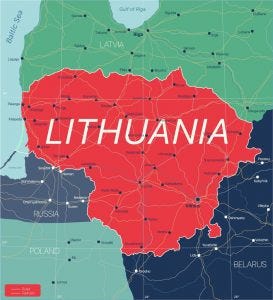
Lithuania’s talent pool ‘ready and waiting’ to service biopharma needs, says development agencyLithuania’s talent pool ‘ready and waiting’ to service biopharma needs, says development agency
Biopharma firms have reported concerns regarding talent shortages across the industry, but Invest Lithuania says it has a talent pool ready and waiting.

Biopharma companies around the world have reported concerns regarding talent shortages across the industry, but Invest Lithuania says it has a large talent pool ready and waiting.
There is a general consensus among professionals that the amount of talent coming through is not reflective of the huge investment in capacity being seen across the Life Sciences industry.
Companies such as Lonza, SwedenBIO, and pharma recruitment firm Lead Candidate have expressed their talent shortage concerns at different points last year.

Image: Stock Photo Secrets
However, the solution to this problem could be solved by the Baltic state Lithuania according to Karolina Karl head of Life Sciences team at non-profit investment agency Invest Lithuania, who told us it has “A pool of highly skilled and motivated talent ready to create added value for your business.”
“Present foreign companies in the country are already benefiting from a solid talent pool. For instance, Thermo Fisher Scientific, which has been recognized as a centre of excellence for biosciences manufacturing and R&D.”
OECD Employment, 2020 Lithuania reported the country has a large academically trained population and the highest employment rate of tertiary-educated young adults in the European Union (EU) at 90%.
“In Lithuania, there are four major Life Sciences universities that ensure the supply of a rich amount of talent pool in Life Sciences,” said Karl.
She continued: “We [have] noticed that Life Sciences studies are becoming more and more attractive and bringing even more talent pool to the industry. Nevertheless, the Lithuanian market in terms of industry players is yet unsaturated and thus companies are able to gather the top-notch talent pool locally.”
Various local enterprises collaborate with the Vilnius University Life Sciences Center, which boasts three bioscience institutes, a hub for cell and gene therapy research, and a Center for Innovative Medicine.
CasZyme, a CRISPR Cas technology and gene editing biotech company is one of the local start-ups based at the University. CEO of CasZyme, Monika Paule told us that “Finding talent is always a challenging process as talent pools are limited in any region within the world.”
“However, the young professional’s study and build their practice in the most demanded fields within the industries and professionals with established careers are very open for requalification and lifelong learning. Thus, the talent pool in Lithuania will renew constantly making it possible to attract it and generate business growth.”
Incentives
Karl discussed how Lithuania is experiencing a “Positive trend of immigration resulting in more and more Lithuanians coming back to Lithuania.”
In 2017 an initiative entitled Work in Lithuania was created and it aimed to encourage professionals who lived overseas to build their careers in Lithuania. This, in conjunction with other incentives such as compulsory internships at Universities, state-funded apprenticeships, and 55,000 people a year being eligible for ad-hoc re-qualification through the Lithuanian Employment Agency expands the country’s skilled personnel.
Meanwhile, other incentives being paraded in Lithuania includes life science companies actively promoting the field. One example that Karl uses is life sciences firm Thermo Fisher, which has been cooperating with Vilnius University and is also introducing the first mobile laboratory in the country, which visits Lithuanian schools.
“The laboratory is called “Mobile Bioclass” and it acquaints students with the latest achievements in biosciences,” said Karl.
She continued: “The laboratory provides students with a unique opportunity to become researchers, at least for a short time. This creates an opportunity not only to test real scientific devices, but they also conduct modern experiments themselves. The program was created for the 9th and older grades students and is a great example of how a company can ensure that once the time [comes] to make a decision [of] which field to choose for the bachelor studies, students would already be familiar with the field and would choose the life sciences.”
About the Author
You May Also Like





